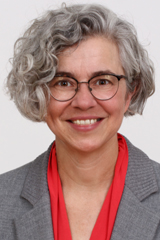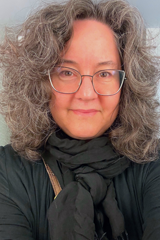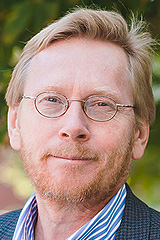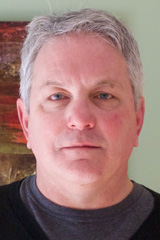On this page:
Nigel Roulet
Brigitte Pientka | Debra Titone | Lyle Whyte | Richard Hovey | Sylvie Lambert
Winner
Nigel Roulet, Geography
“Graduate students need the freedom to discover and fail, but it is my responsibility to help them ‘fail forward’, ensuring that the failures are all constructive experiences.”
Biography
I have been a professor for 31 years in the Department of Geography after teaching at York University for the first ten years of my career. My research combines both empirical and observational science with systems modelling of peatland and forested ecosystems. I am an ecohydrology–ecosystem biogeochemist. I combine aspects of the physical and natural sciences, and my work has been relevant to environmental and climate policy. I have supervised over 50 graduate students and post-doctoral fellows, many of which have gone on to be university professors and research or physical scientists in the public and private sectors.
Approach to graduate supervision
I begin with the assumption that all graduate students are excellent, but I realize that each student is unique and develops differently. I firmly believe students need to explore their potential within certain boundaries. Graduate students need the freedom to discover and fail, but it is my responsibility to help them ‘fail forward’, ensuring that the failures are all constructive experiences. As undergraduates, they often succeed by telling their professors what they know, but I want them to tell me what we don’t know – identify the gaps in knowledge and develop the confidence to propose how they might contribute to filling in the gaps. They have to develop their ability to take intellectual risks and help them over the temporary crises in confidence they will experience. I provide them with the support and encouragement to proceed forward and help them build the confidence needed to become an independent scholar. It is not uncommon for students to create a feeling of being an imposter at this stage, but they soon realize we are all in the same boat.
Testimonials
Prof. Roulet's mentorship has been instrumental in my development as an independent researcher. His encouragement to explore and innovate while being available for guidance when needed has been pivotal in my growth as a scientist. His dedication to ensuring not only the successful completion of degrees but also the preparation of students for their future endeavors outside the university is truly commendable. He leverages his extensive network to foster students' growth and underscores the importance of collaborative research, extending his commitment beyond the university and ensuring that his students’ research is disseminated to the wider scientific community and informs policy discussions. Many past students, including myself, credit Prof. Roulet for fostering critical thinking and decision-making abilities in environmental issues that are crucial in real world scenarios. Encounters with past students who were once under Nigel's tutelage consistently serve as a testament to his influence, highlighting not only his contributions to their professional development but also the profound impact he has had on their personal growth.
Bidhya Sharma, PhD candidate
Department of Geography, McGill University
Nominees
 Brigitte Pientka, Computer Science
Brigitte Pientka, Computer Science
“I believe in building an inclusive and equitable research community where students’ creative and innovative ideas can thrive through a wide range of activities.”
Biography
I am a Full Professor in the School of Computer Science. My main research interests lie in developing theoretical foundations of programming languages. A central question in my work is: How can we design programming languages that ensure that programs are safe and have fewer bugs? I was awarded a Humboldt Fellowship in 2018 and my work on the Beluga language received a Test of Time Award. I work towards overcoming systemic barriers for underrepresented groups. As a member of the executive committee for the Special Interest Group on Programming Languages, I am leading the Equity, Diversity, and Inclusion initiatives. At McGill, I am particularly proud that we have one of the highest representation of women in our computer science undergraduate programs in North-America.
Approach to graduate supervision
I view graduate supervision as both a mentorship and apprenticeship that allows students to hone their skills in analyzing a problem, critically evaluating a proposed solution, and turning a theoretical idea into a practical one. Showing mutual respect is my main guiding principle. More broadly, I believe in building an inclusive and equitable research community where students’ creative and innovative ideas can thrive through a wide range of activities. We actively seek and include guest speakers from underrepresented groups at our workshops and panels, which provides students invaluable exposure to a variety of ideas and broaden their network and perspective.
Testimonials
I applied and came to McGill specifically to study under Professor Pientka, and my experience working with her has only redoubled my belief that I made the best possible choice by doing so. As an instructor, Professor Pientka was engaging and had an infectious enthusiasm, clearly connecting the material we were learning in the classroom to contemporary research being done by her and others in the field. I always admired how dedicated and passionate Professor Pientka was about encouraging women to pursue research in computer science. Women are highly underrepresented in computer science, and even more so in the field of programming languages research. I found it extremely motivating and encouraging to be supervised by someone working so tirelessly to help women succeed in computer science, particularly in the field of programming languages.
Aliya Hameer, Msc student
School of Computer Science, McGill University
 Debra Titone, Psychology
Debra Titone, Psychology
“It is my privilege to create a laboratory and course environment where students feel they belong and are valued.”
Biography
Professor Titone directs the Language and Multilingualism Laboratory. She is recipient of awards that include: a Tier 1 CRC; Donald O. Hebb Distinguished Contribution Award and Richard C. Tees Distinguished Leadership Award from the Canadian Society for Brain, Behavior, & Cognitive Science; and Feminist Mentoring Award from CPA. She co-founded and co-directs Women in Cognitive Science Canada+, https://wicsc.ca/. Her work investigates how linguistic experience and domain-general neurocognitive capacities converge in reading, speaking, writing, and decision-making. She uses experimentally sensitive methods (e.g., eye movement recordings, ERPs), to which she applies varied analytic methods (e.g., linear mixed effects modeling, network analysis).
Approach to graduate supervision
Graduate supervision is central to who I am as an academic. It is my privilege to create a laboratory and course environment that affords equitable access to opportunity and outstanding science, where students feel they belong and are valued. I am particularly gratified when students come to consider me, and other students in my courses or lab, as part of their own professional networks. This is crucial because, as a former Graduate Program Director, I know first-hand how graduate students can feel isolated or siloed within lab environments along personal or professional lines. Graduate courses are invaluable opportunities to counter this, and I strive to capitalize on the opportunity. For courses, I take concrete actions that include: surveying students ahead of the course to co-select readings that build on their interests; creating assignments that have authentic value for the course and students’ progress.
Testimonials
When it comes to mentorship, Dr. Debra Titone goes above and beyond. I have had the pleasure of having her as not only one of my co-supervisors during my time at McGill, but also as my professor and advocate. In all of these roles, she has been an excellent mentor to me. She has shown me the path that I hope to take in my academic life – One that balances rigorous scientific inquiry and empathetic engagement with the world around her. She knows each of her students as people–what we are suited to, what our weaknesses are, how to best support us. More than just inspiring my future goals, she has given me (and so many other students) the tools I need to achieve them.
Vegas Hodgins, PhD student
Department of Psychology, McGill University
Dr. Titone's approach to graduate supervision transcended the conventional role of an advisor. She was deeply invested in her students' success and well-being, prioritized their individual needs and aspirations, and tailored her guidance to their unique strengths and interests. This strong student-centred mentorship approach promoted an inclusive, collaborative, and intellecturally stimulating research environments that maximized student learning. She encouraged open dialogue, creativity, and critical thinking, empowering students to explore new ideas and make meaningful contributions to the field. In my current role as an Associate Professor at the University of New Brunswick, I find myself continually drawing upon the skills and valued instilled by her. Her guidance has significantly influenced my approach to teaching, mentorship, and research, as well as who I am as a person today.
Dr. Veronica Whitford, Associate Professor and Canada Research Chair - Tier II
Department of Psychology, University of New Brunswick
 Lyle Whyte, Natural Resource Sciences
Lyle Whyte, Natural Resource Sciences
“I have been very fortunate to recruit high caliber students at all levels, and to provide direction to develop their leadership and professional skillsets, and to provide guidance in their career choices.”
Biography
Lyle Whyte (Professor, Natural Resource Sciences / McGill Space Institute) is a Canada Research Chair (Tier 1) in Polar Microbiology (2018-2025). He explores the biodiversity, ecology, and activity of microbial communities at subzero temperatures in cryoenvironments. His research program examines microbial biodiversity, activity, and ecology in polar ecosystems, especially permafrost and unique cold saline springs, in the emerging field of cryomicrobiology, the exploration of the low-temperature limits of microbial life and their biotechnology applications. The utility of these unique cryoenvironments as analogs for astrobiology studies is also a key feature of his research program. He is currently Chair of the CSA Planetary Exploration Consultation Committee (PECC) and was the PI of the NSERC CREATE Canadian Astrobiology Training Program (2009-2015). He was a member of the ExoMars 2020 Landing Site Selection Working Group (LSWWG) and is currently an invited member of the ExoMars Rover Operations Science Working Group (ROSWG), the ExoMars PanCan Science Team and will also be serving on the ExoMars Rover Mission Operations team. Whyte is a member of the COSPARS Panel on Planetary Protection (2023-2027).
Approach to graduate supervision
I have an important responsibility in ensuring that students under my supervision depart from McGill with excellent research, teaching, and professional skills both to build successfully careers and to make significant contributions to the scientific community in areas important to Canada's cultural, social and economic growth, public policy issues, and quality of life. I have strived to create in my research group an open, inclusive, and equitable manner as well as a scientifically enriching environment which I believe is at least partially responsible for our high success rate and retainment. I have been very fortunate to recruit high caliber students at all levels, and to provide direction to develop their leadership and professional skillsets, and to provide guidance in their career choices.
Testimonials
As a young graduate student transitioning from a smaller university to a world-renowned institution like McGill, I was initially nervous about whether I would measure up. However, Dr. Whyte always believed in my abilities and gave me the confidence to strive for impactful research, making me feel like I truly belong among top academics.
I feel incredibly fortunate to have Dr. Whyte as my supervisor. He has given me the incredible opportunity to see the world by attending conferences and living out my dream of visiting both the Arctic and Antarctica as part of research expeditions. His guidance and feedback have enabled me to achieve more than I ever thought possible. I am a better scientist because of him, and I will be forever grateful for the time I spent in his lab.
Brady O'Connor, PhD student
Microbiology, Natural Resource Sciences & Trottier Space Institute
 Richard Hovey, Dental Medicine and Oral Health Sciences
Richard Hovey, Dental Medicine and Oral Health Sciences
“My approach to graduate teaching is based on the interweaving of all the best attributes and practices of teachers I have learned from throughout my life. ”
Biography
Dr Richard Hovey, PhD., is currently an Associate Professor, Faculty of Dental Medicine and Oral Health Sciences, at McGill University in Montreal QC. He has extensive experience as a qualitative researcher and educator. My research expertise is focused on understanding the experiences of persons living with chronic pain, osteoporosis, Indigenous health, diabetes, and cancer, as well as, patient safety, person centered healthcare, health professional education, communication, leadership, and interdisciplinary practice. I believe that it is through the collective interpretation of text as testimony or personal narratives, artwork, and drama from multiple perspectives that we can begin to understand the meaning of complex human experiences. My research approach applies philosophical hermeneutics and phenomenology to concentrate learning to bridge gaps between theory and practice. My research approach engages stakeholders, to foster multiple perspectives and understandings that inform and enhance the transition between healthcare systems, individuals, and a community of care.
Approach to graduate supervision
I am a qualitative researcher who, with the help of my students, endeavors to bring the voices and experiences of people living with challenging chronic health conditions into the world. The hope is to teach others about a circumstance they themselves may not have yet experienced but may encounter clinically. My approach to graduate teaching is based on the interweaving of all the best attributes and practices of teachers I have learned from throughout my life. This coupled with adult learning theories such as transformational learning and an approach ground in applied philosophical hermeneutics, I endeavor through active and communitive learning to facilitate and enhance graduate student learning. In this way the expert is replaced with expertise as a shared experience, one in which everyone has an opportunity to participate, teach, and learn while evolving into a researcher.
Testimonials
As a supervisor, Prof. Hovey has a way of teaching that provides space for the student to take their time and process their understanding, while providing sufficient support for questions and inquiries of all forms. How present and involved a supervisor is, particularly in the context of a doctoral program, can mark the difference between a difficult and unpleasant graduate experience and an enthralling and impactful one. The quality of Prof. Hovey’s supervision has guided me toward what can only be accurately described as the most stimulating and meaningful scholarly experiences I’ve had throughout my entire academic career. A good citizen is a well-rounded one, one who has empathy, compassion, and interpersonal skills, one who does not avoid challenges but embraces the lessons that may come with them. Prof. Hovey helps create a safe space where we can both be and pursue our interests to their fullest.
Nioushah Noushi, PhD Candidate
Dental Medicine and Oral Health Sciences, McGill University
 Sylvie Lambert, Ingram School of Nursing
Sylvie Lambert, Ingram School of Nursing
“I aim to promote students’ intellectual curiosity and research excellence by creating a supervision environment that is empowering to students to become independent, ethical researchers and professionals.”
Biography
Dr Sylvie Lambert is Associate Professor and Canada Research Chair at the Ingram School of Nursing, McGill University and a Scientist at the St. Mary’s Research Centre. Her research interests include: 1) understanding the impact of cancer on patients and their family caregivers well-being; 2) developing and evaluating cost-effective self-management interventions; 3) real-world implementation of patient-reported outcome measures (PROMs); and 4) adapting self-management interventions to the needs of patients from a culturally and linguistically diverse background and their caregivers. Dr. Lambert has over 140 publications and $6M in grant funding. The high-quality of her research has been recognized by several national and international awards and prizes.
Approach to graduate supervision
Graduate student supervision is a privilege, and I take this responsibility seriously. As an educator and mentor, I aim to promote students’ intellectual curiosity and research excellence by creating a supervision environment that is empowering to students to become independent, ethical researchers and professionals. I encourage students to approach their project with a well-developed critical sense and as they progress through their graduate studies and create a learning environment where divergent perspectives are valued and seen has contributing to the advancement of knowledge. I am dedicated to high-quality research supervision to train leaders who are ready to tackle current and future challenges of psychosocial cancer care through invocative and impactful research.
Testimonials
Having worked with Dr Lambert as a junior research assistant, study coordinator, and now doctoral student, I can attest that she is an exceptional mentor and supervisor. She provides reliable support, fosters positive team dynamics, and is intellectually generous in sharing her knowledge and expertise. This was especially true amidst the challenges posed by the Covid-19 pandemic, which led to the suspension of healthcare recruitment activities on several occasions, Dr Lambert’s unwavering presence was instrumental in navigating these challenges and adjusting the procedures for my thesis study. Her guidance has been outstanding in developing a wide range of skills and cultivating connections essential for success.
Lydia Ould Brahim, RN, MScA, PhD candidate
Ingram School of Nursing, McGill University
 This work is licensed under a
This work is licensed under a 